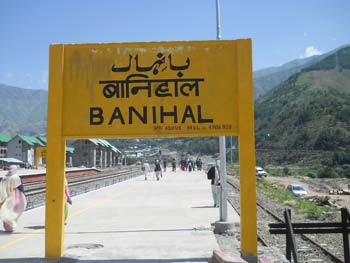 These days the train normally remains overloaded by passengers, exceeding the normal capacity of 650 passengers. “There would be around 900 passengers,” says Rai. This huge number is also adding Rs 40000 on an average to the kitty of railway department every day.
These days the train normally remains overloaded by passengers, exceeding the normal capacity of 650 passengers. “There would be around 900 passengers,” says Rai. This huge number is also adding Rs 40000 on an average to the kitty of railway department every day.
Having all weather accessibility, the Banihal railway link will be a breather for those travelling between Jammu and Srinagar especially during winters as traffic will now be plying throughout the year, between Qazigund and Banihal that often remains closed due to heavy snowfall.
“During winters it was difficult to tackle the traffic when tunnel would get closed due to snowfall. Now railway has solved that problem,” Says Ali Mohammad Tenzu former traffic police officer who has mostly served in Qazigund-Banihal area during winters.
The new railway tunnel has a parallel 3 meter wide road for the movement of small vehicles which will be used in case of any emergency especially during winters.
Passengers travelling to any destination up to Jammu can now reach Banihal through train and from there onwards can hire a taxi or travel by bus and those coming from these destinations can change over to train at Banihal. This would save both the time and money.
Though there is no worthwhile taxi stand in Banihal at present, however efforts are on to develop one such stand for the benefit of travelers. “We are keenly looking at it and very soon we will decide about a spacious taxi stand,” says Abdul Hamid, President of Chinar taxi stand the only stand in Banihal.
“I normally travelled by road from Srinagar to Jammu. Now as the train has started I will prefer to go via train to Banihal and then to Jammu. This will save my time and money as well,” says Ramesh, who has been working in Kashmir for last fifteen years.
For passengers travelling from Banihal to Srinagar hiring a taxi would cost Rs 170 a passenger. But those who will travel by train it will be just Rs 20. “Train will be very useful for the public,” says Hamid, a passenger.
Connecting Kashmir with Jammu by a railway line was first thought of by Dogra ruler, Maharaja Pratap Singh in 1898. In 1902 the Britain proposed a rail link between Srinagar and Rawalpindi along river Jehlum. The project failed to take off. In 1905, Maharaja Pratap Singh nearly approved an electric-powered rail line between Jammu and Srinagar. The project didn’t take off as it would have been a slow train, operational only during summer months.
In 1947 a proposal to extend the rail link between Pathankot and Jammu to Srinagar was abandoned because of high costs involved. Indira Gandhi in 1983 also proposed a project to connect Udhampur to Jammu by train. Infact a budget of Rs 50 crore was set for it and had to be completed within five years. In 1996 the then PM P V Narasimha Rao announced Rs 2,600 crore for Kashmir’s rail link.
 In 1997 H D Deve Gowda laid the foundation stone of the 290-km Udhampur-Baramulla railway link. In the same year, when I K Gujral became the prime minister, he also laid the foundation stone of the railway link at Baramulla.
In 1997 H D Deve Gowda laid the foundation stone of the 290-km Udhampur-Baramulla railway link. In the same year, when I K Gujral became the prime minister, he also laid the foundation stone of the railway link at Baramulla.
During Atal Bihari Vajpayee’s government Rs 6000 crore were earmarked for the rail link to Kashmir and August 15, 2007, was set as the deadline. It was Prime Minister Manmohan Singh who inaugurated the first phase of 55-km Jammu-Udhampur stretch in 2005 and the 66-km stretch from Anantnag to Mazhom in 2008. In 2009 an 18-km link connecting Anantnag with Qazigund in south Kashmir became operational.
















keeping in view occupation of Jammu and Kashmir by Endian establishment, only economic aspect cannot be touched; the impact on culture and ethos of Banihal in particular and Kashmir in general should also have been included. the conversion of agricultural land that is the most important factor of Kashmir to be independent is now being made dependent more on imports………………..much more!!!!!